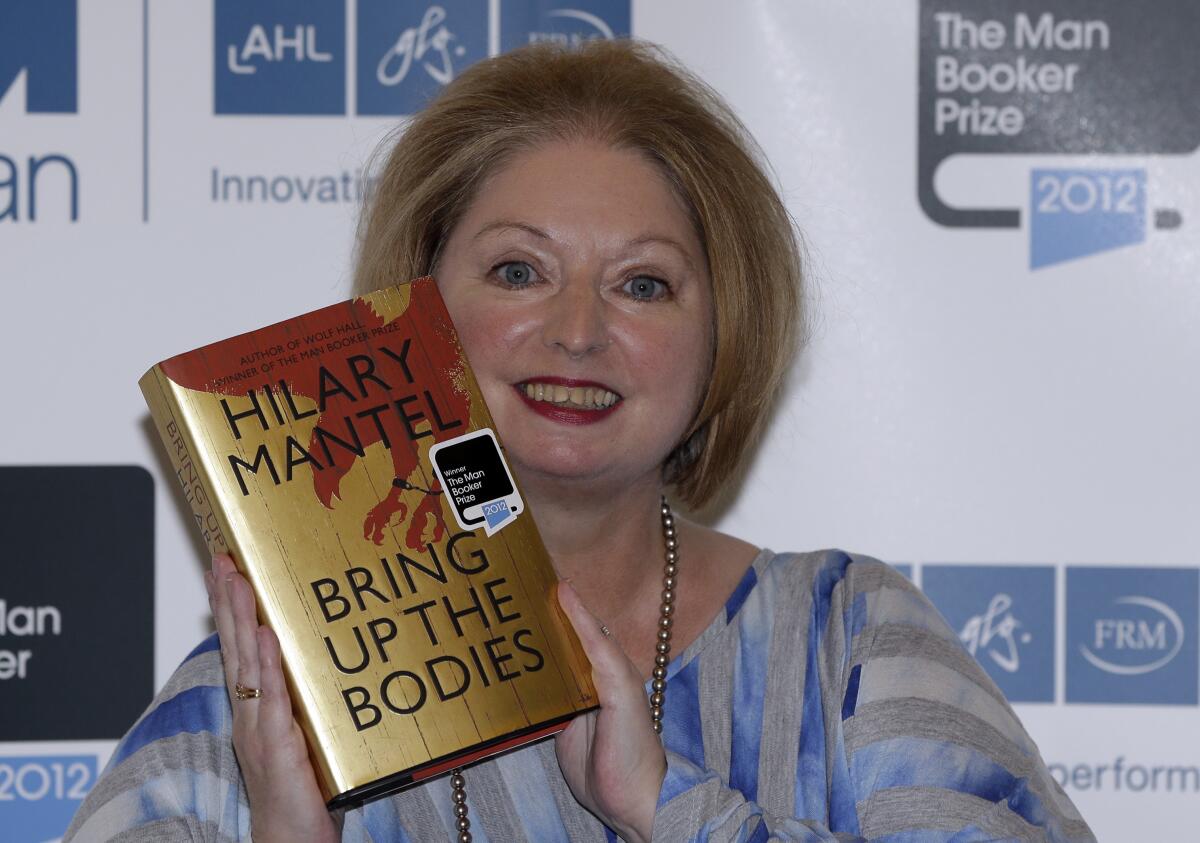Hilary Mantel, author of acclaimed Tudor-era ‘Wolf Hall’ trilogy, dies at 70

- Share via
LONDON — Hilary Mantel, the Booker Prize-winning author of the acclaimed “Wolf Hall” trilogy of historical novels, has died. She was 70.
Mantel died “suddenly yet peacefully” surrounded by close family and friends, publisher HarperCollins said Friday.
Mantel is credited with re-energizing historical fiction with “Wolf Hall” and two sequels about the 16th century English power broker Thomas Cromwell, right-hand man to King Henry VIII.
HarperCollins said Mantel was “one of the greatest English novelists of this century.”
“Her beloved works are considered modern classics. She will be greatly missed,” the publishing house said in a statement.
Author J.K. Rowling tweeted: “We’ve lost a genius.” Scottish First Minister Nicola Sturgeon said that it was “impossible to overstate the significance of the literary legacy Hilary Mantel leaves behind.”
Mantel won the Booker Prize twice, for “Wolf Hall” in 2009 and its sequel “Bring Up the Bodies” in 2012. Both were adapted for the stage and television, as was the final installment, “The Mirror and the Light,” which came out in 2020.
“The Mirror & the Light” finally completes the grand English royal saga involving Thomas Cromwell.
Nicholas Pearson, Mantel’s longtime editor, said her death was “devastating.”
“Only last month I sat with her on a sunny afternoon in Devon, while she talked excitedly about the new novel she had embarked on,” he said. “That we won’t have the pleasure of any more of her words is unbearable. What we do have is a body of work that will be read for generations.”
Before “Wolf Hall,” Mantel was the critically acclaimed but modestly selling author of novels on subjects as diverse as the French Revolution (“A Place of Greater Safety”) and the life of a psychic medium (“Beyond Black”).
“For most of my career I wrote about odd and marginal people,” Mantel said in 2017. “They were psychic. Or religious. Or institutionalized. Or social workers. Or French. My readers were a small and select band until I decided to march on to the middle ground of English history and plant a flag.”
She also wrote a memoir, “Giving Up the Ghost,” that chronicled years of ill health, including undiagnosed endometriosis that left her infertile.
Barring tragedy or revolution, Britain is set to have a man instead of a woman on the throne for the next 75 years at least.
She once said the years of illness wrecked her dream of becoming a lawyer but made her a writer.
Mantel’s literary agent, Bill Hamilton, said the author had dealt “stoically” with chronic health problems.
“We will miss her immeasurably, but as a shining light for writers and readers she leaves an extraordinary legacy,” he said.
Born in Derbyshire in central England in 1952, Mantel attended a convent school, then studied at the London School of Economics and Sheffield University. She worked as a social worker at a geriatric hospital, an experience she drew on for her first two novels, “Every Day Is Mother’s Day,” published in 1985, and “Vacant Possession,” which followed the next year.
At a memorial service Wednesday for Joan Didion, who died in December, Vanessa Redgrave read, nephew Griffin Dunne remembered and Patti Smith sang.
In the 1970s and 1980s she lived in Botswana and Saudi Arabia with her husband, Gerald McEwen, a geologist.
Mantel had been a published novelist for almost 25 years when her first book about Cromwell turned her into a literary superstar. She turned the shadowy Tudor political fixer into a compelling, complex literary hero, by turns thoughtful and thuggish.
A self-made man who rose from poverty to power, Cromwell was an architect of the Reformation who helped Henry realize his desire to divorce Catherine of Aragon and marry Anne Boleyn — and, later, to be rid of Boleyn so he could marry Jane Seymour, the third of what would be the Tudor king’s six wives.
The Vatican’s refusal to annul Henry’s first marriage led the monarch to reject the authority of the pope and install himself as head of the Church of England.
Sign up for our Book Club newsletter
Get the latest news, events and more from the Los Angeles Times Book Club, and help us get L.A. reading and talking.
You may occasionally receive promotional content from the Los Angeles Times.
The dramatic period saw England transformed from a Roman Catholic to a Protestant nation, from medieval kingdom to emerging modern state, and it has inspired countless books, films and television series, from “A Man for All Seasons” to “The Tudors.”
But Mantel managed to make the well-known story exciting and suspenseful.
“I’m very keen on the idea that a historical novel should be written pointing forward,” she told the Associated Press in 2009. “Remember that the people you are following didn’t know the end of their own story. So they were going forward day by day, pushed and jostled by circumstances, doing the best they could, but walking in the dark, essentially.
Mantel also turned a sharp eye to Britain’s modern-day royalty. A 2013 lecture in which she described the former Kate Middleton, wife of Prince William and now the Princess of Wales, as a “shop-window mannequin, with no personality of her own,” drew the ire of the British tabloid press.
Laura Warrell discusses her debut novel, ‘Sweet, Soft, Plenty Rhythm,’ and the decades of disappointment — in love and publishing — that made it possible.
Mantel said she wasn’t talking about the duchess herself but rather describing a view of Middleton constructed by the press and public opinion. The author nonetheless received criticism from then-Prime Minister David Cameron, among others.
Right-wing commentators also took issue with a short story titled “The Assassination of Margaret Thatcher,” which imagined an attack on the former Conservative prime minister. It was published in 2014, the same year that the late Queen Elizabeth II, who died earlier this month, made Mantel a dame, the female equivalent of a knight.
Mantel remained politically outspoken. An opponent of Brexit, she said in 2021 that she hoped to gain Irish citizenship and become “a European again.”
Mantel is survived by McEwen.
More to Read
Start your day right
Sign up for Essential California for the L.A. Times biggest news, features and recommendations in your inbox six days a week.
You may occasionally receive promotional content from the Los Angeles Times.









